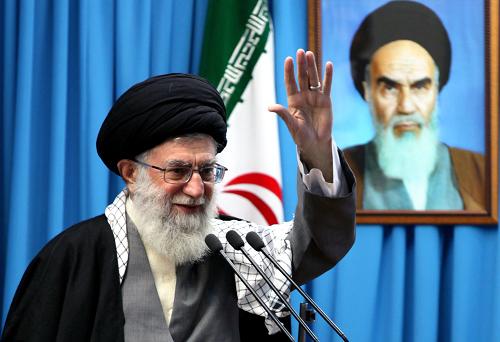US to stop Iran from becoming nuclear power
 0 Comment(s)
0 Comment(s) Print
Print E-mail Xinhua, February 6, 2012
E-mail Xinhua, February 6, 2012
U.S. President Barack Obama said on Sunday that the U.S. will work with Israel to prevent Iran from becoming a nuclear power, while signaling that a diplomatic resolution to the current crisis is still possible.
 |
|
Iranian Supreme Leader Ayatollah Seyyed Ali Khamenei dismissed on Feb. 3, 2012,?Western sanctions and warned against the U.S. war threats against the Islamic Republic. [Xinhua photo] |
In an interview with the NBC from the White House, Obama said that both the U.S. and Israel, which is "rightly" concerned about Iran's nuclear program, believe that "Iran has to stand down."
When asked if Israel is determined to attack Iran, Obama said that he didn't think that Israel has made such decision. "We don't see any evidence that they have those intentions or capabilities right now," he said, adding that the U.S. and Israel will work "in Lockstep" on dealing with the Iranian nuclear standoff.
The U.S. President emphasized that his goal was to resolve the nuclear standoff diplomatically, though repeating that he was not taking any options off the table.
"We're going to do everything we can to prevent Iran from getting a nuclear weapon and creating an arms race - a nuclear arms race - in a volatile region," Obama said.
Obama made the remarks after U.S. media revealed on Thursday that U.S. Defense Secretary Leon Panetta believed that Israel could attack Iran this spring to prevent Tehran from acquiring a nuclear weapon.
Panetta believed that there is a strong likelihood that Israel will strike Iran in April, May or June before Iran enters what Israelis described as a "zone of immunity" to commence building a nuclear bomb, according to an article written by the Washington Post columnist David Ignatius.
The article said that Obama and Panetta had cautioned the Israelis that the U.S. opposes an attack, believing that it would derail an increasingly successful international economic sanctions program and other non-military efforts to stop Iran from crossing the nuclear threshold.
While believing that Israeli Prime Minister Benjamin Netanyahu has not made a final decision to attack Iran, senior U.S. officials are still worried about "the guns of spring -- and the unintended consequences," the article added.





